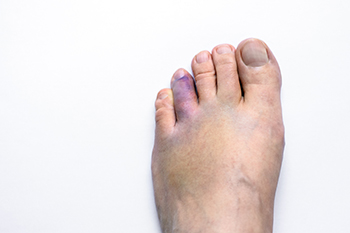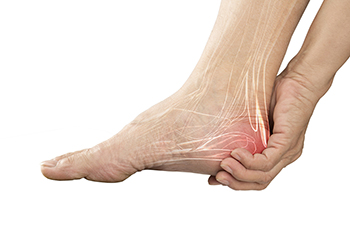Items filtered by date: June 2023
What Are the Symptoms of a Broken Toe?

The bones in the toe are small and fragile and may easily break when stubbed against a piece of furniture. Each toe has two or three bones and may fracture if a heavy object drops on one or more toes. Immediate symptoms of a broken toe can consist of swelling and bruising, and it is often difficult to move. An X-ray can be performed to determine the fracture's severity. The buddy taping method can provide adequate healing if the toe is mildly broken. This is done by taping the broken toe to the toe next to it, which can provide the necessary stability as the healing process occurs. Many people will purchase larger shoes that can accommodate their broken toe. If the injury causes a bone to protrude from the toe, different treatment methods may be required for proper healing. If you have broken your toe, it is suggested that you visit a podiatrist who can offer the treatment technique that is right for you.
A broken toe can be very painful and lead to complications if not properly fixed. If you have any concerns about your feet, contact Harris Greenberger, DPM from Fairfield County Foot Surgeons. Our podiatrist will treat your foot and ankle needs.
What to Know About a Broken Toe
Although most people try to avoid foot trauma such as banging, stubbing, or dropping heavy objects on their feet, the unfortunate fact is that it is a common occurrence. Given the fact that toes are positioned in front of the feet, they typically sustain the brunt of such trauma. When trauma occurs to a toe, the result can be a painful break (fracture).
Symptoms of a Broken Toe
- Throbbing pain
- Swelling
- Bruising on the skin and toenail
- The inability to move the toe
- Toe appears crooked or disfigured
- Tingling or numbness in the toe
Generally, it is best to stay off of the injured toe with the affected foot elevated.
Severe toe fractures may be treated with a splint, cast, and in some cases, minor surgery. Due to its position and the pressure it endures with daily activity, future complications can occur if the big toe is not properly treated.
If you have any questions please feel free to contact our office located in Norwalk, CT . We offer the newest diagnostic and treatment technologies for all your foot and ankle needs.
What is Ankylosing Spondylitis?

Ankylosing spondylitis, or AS, is a chronic autoimmune disease that is rheumatic and causes widespread inflammation and pain in the joints and soft tissues, especially in the spine. More advanced cases of this condition can also impact peripheral areas like the heel and cause pain. If left untreated, the pain can be severe and accompanied by stiffness and immobility. The reason Ankylosing spondylitis develops is unknown but it can come from genetics. People that seem to be at higher risk for this affliction include those between the ages of 17 and 45 or people that have Crohn’s disease, psoriasis, or ulcerative colitis. If you have heel pain and it is severe or worsens, it is suggested that you see a podiatrist to determine whether you have AS or another illness. Once the reason for your pain is identified, a podiatrist can provide the appropriate treatment.
Many people suffer from bouts of heel pain. For more information, contact Harris Greenberger, DPM of Fairfield County Foot Surgeons. Our podiatrist can provide the care you need to keep you pain-free and on your feet.
Causes of Heel Pain
Heel pain is often associated with plantar fasciitis. The plantar fascia is a band of tissues that extends along the bottom of the foot. A rip or tear in this ligament can cause inflammation of the tissue.
Achilles tendonitis is another cause of heel pain. Inflammation of the Achilles tendon will cause pain from fractures and muscle tearing. Lack of flexibility is also another symptom.
Heel spurs are another cause of pain. When the tissues of the plantar fascia undergo a great deal of stress, it can lead to ligament separation from the heel bone, causing heel spurs.
Why Might Heel Pain Occur?
- Wearing ill-fitting shoes
- Wearing non-supportive shoes
- Weight change
- Excessive running
Treatments
Heel pain should be treated as soon as possible for immediate results. Keeping your feet in a stress-free environment will help. If you suffer from Achilles tendonitis or plantar fasciitis, applying ice will reduce the swelling. Stretching before an exercise like running will help the muscles. Using all these tips will help make heel pain a condition of the past.
If you have any questions please contact our office located in Norwalk, CT . We offer the newest diagnostic and treatment technologies for all your foot and ankle needs.
Who Is Prone to Developing Bunions?

A bunion is a deformity that can alter the shape of the foot. Bunions are visible due to the bony lump that develops on the side of the big toe. If the bunion grows large enough, it can cause the other toes to shift toward each other, and wider shoes may have to be purchased. A bunion can develop from genetic reasons or from wearing shoes that have little room in the toe area. High heels can fall into this category and that may be a reason why women incur this condition more than men. One of the first symptoms that many patients notice is inflammation surrounding the joint of the big toe. The bunion may gradually turn red and the texture can change. Untreated bunions can affect an individual’s balance and walking and running can be compromised. Temporary relief may come from putting a protective pad over the bunion as this may help to prevent calluses from forming. If you have a bunion, it is suggested that you confer with a podiatrist who can determine what the best treatment is for you.
If you are suffering from bunions, contact Harris Greenberger, DPM of Fairfield County Foot Surgeons. Our podiatrist can provide the care you need to keep you pain-free and on your feet.
What Is a Bunion?
A bunion is formed of swollen tissue or an enlargement of boney growth, usually located at the base joint of the toe that connects to the foot. The swelling occurs due to the bones in the big toe shifting inward, which impacts the other toes of the foot. This causes the area around the base of the big toe to become inflamed and painful.
Why Do Bunions Form?
Genetics – Susceptibility to bunions are often hereditary
Stress on the feet – Poorly fitted and uncomfortable footwear that places stress on feet, such as heels, can worsen existing bunions
How Are Bunions Diagnosed?
Doctors often perform two tests – blood tests and x-rays – when trying to diagnose bunions, especially in the early stages of development. Blood tests help determine if the foot pain is being caused by something else, such as arthritis, while x-rays provide a clear picture of your bone structure to your doctor.
How Are Bunions Treated?
- Refrain from wearing heels or similar shoes that cause discomfort
- Select wider shoes that can provide more comfort and reduce pain
- Anti-inflammatory and pain management drugs
- Orthotics or foot inserts
- Surgery
If you have any questions, please feel free to contact our office located in Norwalk, CT . We offer the newest diagnostic and treatment technologies for all your foot care needs.
Who Can Develop Tarsal Tunnel Syndrome?

The foot condition that is known as tarsal tunnel syndrome is caused by repetitive pressure. The tibial nerve is affected by this ailment and is located inside the tarsal tunnel. There are various reasons why this nerve can become irritated. People who have severely flat feet may have ankle pain, possibly indicating tarsal tunnel syndrome has developed. Additionally, inflammation from medical conditions, such as arthritis or diabetes, may lead to getting tarsal tunnel syndrome. People who are born with certain foot deformities may experience this condition as well and are generally under the care of a podiatrist. Additional symptoms that are associated with tarsal tunnel syndrome can consist of pain in the Achilles tendon area, swollen ankles, or a feeling of warmth when touched. If you have this condition, it is strongly suggested that you consult with a podiatrist who can offer you the correct treatment options.
Tarsal tunnel syndrome can be very uncomfortable to live with. If you are experiencing tarsal tunnel syndrome, contact Harris Greenberger, DPM of Fairfield County Foot Surgeons. Our podiatrist can provide the care you need to keep you pain-free and on your feet.
Tarsal Tunnel Syndrome
Tarsal tunnel syndrome, which can also be called tibial nerve dysfunction, is an uncommon condition of misfiring peripheral nerves in the foot. The tibial nerve is the peripheral nerve in the leg responsible for sensation and movement of the foot and calf muscles. In tarsal tunnel syndrome, the tibial nerve is damaged, causing problems with movement and feeling in the foot of the affected leg.
Common Cause of Tarsal Tunnel Syndrome
- Involves pressure or an injury, direct pressure on the tibial nerve for an extended period of time, sometimes caused by other body structures close by or near the knee.
- Diseases that damage nerves, including diabetes, may cause tarsal tunnel syndrome.
- At times, tarsal tunnel syndrome can appear without an obvious cause in some cases.
The Effects of Tarsal Tunnel Syndrome
- Different sensations, an afflicted person may experience pain, tingling, burning or other unusual sensations in the foot of the affected leg.
- The foot muscles, toes and ankle become weaker, and curling your toes or flexing your foot can become difficult.
- If condition worsens, infections and ulcers may develop on the foot that is experiencing the syndrome.
A physical exam of the leg can help identify the presence of tarsal tunnel syndrome. Medical tests, such as a nerve biopsy, are also used to diagnose the condition. Patients may receive physical therapy and prescriptive medication. In extreme cases, some may require surgery.
If you have any questions please feel free to contact our office located in Norwalk, CT . We offer the newest diagnostic and treatment technologies for all your foot and ankle needs.

